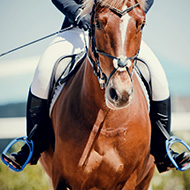Equine ethics and wellbeing survey garners significant response

“If our sport is to keep its social license, our community and the public need to believe and trust that our work is being carried out to the highest moral and ethical standards" - Ingmar De Vos, FEI president.
A new survey to gather opinions from the equine community on ethics and wellbeing, as well as concerns regarding the use of horses in sport, has garnered more than 4,500 responses.
The FEI's newly-formed Equine Ethics and Wellbeing Commission discussed the early survey results during their first in-person meeting, held at the FEI Headquarters in Lausanne (3-4 August).
FEI president, Ingmar De Vos, commented: “We cannot assume there is general acceptance of horse use in sport, and it’s important that we – the global governing body - proactively seek input from the community to gauge and to address any concerns they may have.
"Equestrian sport depends on the wellbeing of its horses, and the FEI has a duty to ensure high standards of welfare for the horses competing in each of our disciplines, and also to consider the impact that our sporting activities have on the environment. This is a role we understand and we are fully committed to.
He added: “If our sport is to keep its social license, our community and the public need to believe and trust that our work is being carried out to the highest moral and ethical standards. While we have comprehensive systems and mechanisms in place to protect the welfare of the horse, we need to have our finger on the pulse so that we understand, and then clearly address, the priority concerns for different stakeholders, including the public.”
The Equine Ethics and Wellbeing Commission has launched two surveys to support its work: the equestrian stakeholder survey and a public opinion survey.
The equestrian stakeholder survey draws on the views of FEI athletes, officials, owners, organising committees, grooms, national federations and related associations. This survey will remain open until 19 August and will be available in English, French and Spanish.
The public opinion survey will be sent out via a marketing research and data company to reach 14 key global markets and will also availiable in several languages.
Survey results will be analysed and considered alongside feedback from focus groups, the latest equine wellbeing research and related industry-body input. Researchers hope the insights will inform a framework to guide the future development of FEI regulations, policies and practices.
Dr Natalie Waran, chair of the Equine Ethics and Wellbeing Commission, said: “The significant number of responses we have already received is a good indication that the equestrian community is ready and willing to discuss issues related to the welfare of horses in sport.
“The equestrian community is complex, and there are many different stakeholders with diverse points of view. We want to gather and understand these concerns and then consider what should be done to not only help improve equine wellbeing but also address the understanding of horse use in sport around the world.”
She continued: “It is clear that equine welfare is important for those who are involved with horses at all levels as well as being of concern to members of the public. Improving welfare standards and practice requires a commitment from everyone within the equestrian community. These surveys are not just an opportunity for the Commission to understand global attitudes but also a chance for the general public to have their opinions heard and addressed.”



 A free webinar exploring the development of the Kennel Club's registration system and the evolution of closed breed registers has been announced.
A free webinar exploring the development of the Kennel Club's registration system and the evolution of closed breed registers has been announced.